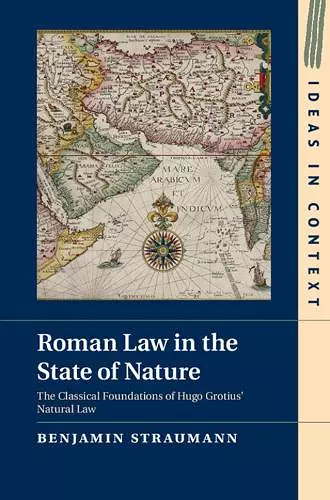Roman Law in the State of Nature
The Classical Foundations of Hugo Grotius' Natural Law
Format:Hardback
Publisher:Cambridge University Press
Published:12th Feb '15
Currently unavailable, and unfortunately no date known when it will be back
This hardback is available in another edition too:
- Paperback£24.99(9781107470163)

This book offers a new interpretation of the foundations of Hugo Grotius' highly influential doctrine of natural law and natural rights.
This comprehensive analysis of the foundations of Hugo Grotius' natural law theory assesses for the first time the importance of texts from classical antiquity, especially Roman law and a specifically Ciceronian brand of Stoicism, and explores the significance of the Roman tradition for Grotius, a humanist steeped in Roman law.Roman Law in the State of Nature offers a new interpretation of the foundations of Hugo Grotius' natural law theory. Surveying the significance of texts from classical antiquity, Benjamin Straumann argues that certain classical texts, namely Roman law and a specifically Ciceronian brand of Stoicism, were particularly influential for Grotius in the construction of his theory of natural law. The book asserts that Grotius, a humanist steeped in Roman law, had many reasons to employ Roman tradition and explains how Cicero's ethics and Roman law - secular and offering a doctrine of the freedom of the high seas - were ideally suited to provide the rules for Grotius' state of nature. This fascinating new study offers historians, classicists and political theorists a fresh account of the historical background of the development of natural rights, natural law and of international legal norms as they emerged in seventeenth-century early modern Europe.
'Grotius' significant influence on the development of international law is undisputed, and existing scholarship has investigated his works from almost every possible perspective. The more surprising it seems, then, that the Roman legacy and, in particular, the significant influence of Cicero's writings on Grotius, have been neglected. Straumann addresses this issue masterfully in his competent and original interpretation. His command of the ancient and early modern material is exemplary.' Peter Schröder, History Today
'Straumann's interpretation … is based on a line of argument that in many ways is original … [a few] words do not do justice to the riches of Straumann's use of classical sources to interpret Grotius, but his ambition goes beyond this.' Knud Haakonssen, Bryn Mawr Classical Review
'Focusing on the ideas in the texts, rather than the texts themselves, Grotius may very well be considered a pioneering thinker, and the work under review does a very good job of cementing his place in the history of ideas. I would therefore strongly recommend legal historians, Romanists and historians of political theory, philosophy and ideas alike to pick up this book.' Jacob Giltaij, Grotiana
'Straumann's book is a magnificent achievement … it deserves a wide readership. The book, which will be an instant classic in Grotius studies, will naturally attract the interest of historians of political thought, legal historians and classicists. But I would also recommend this book especially to practitioners of contemporary Anglophone moral and political philosophy, who should be reminded why Grotius was, for centuries, regarded as the towering figure in the history of modern ethics.' Daniel Lee, History of Political Thought
ISBN: 9781107092907
Dimensions: 231mm x 155mm x 23mm
Weight: 540g
286 pages